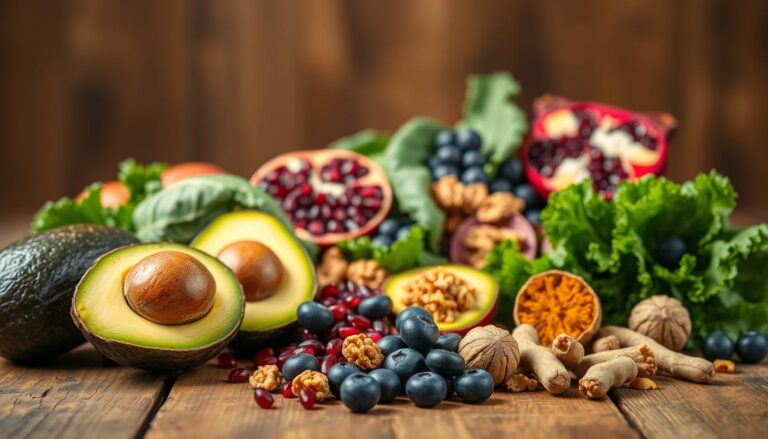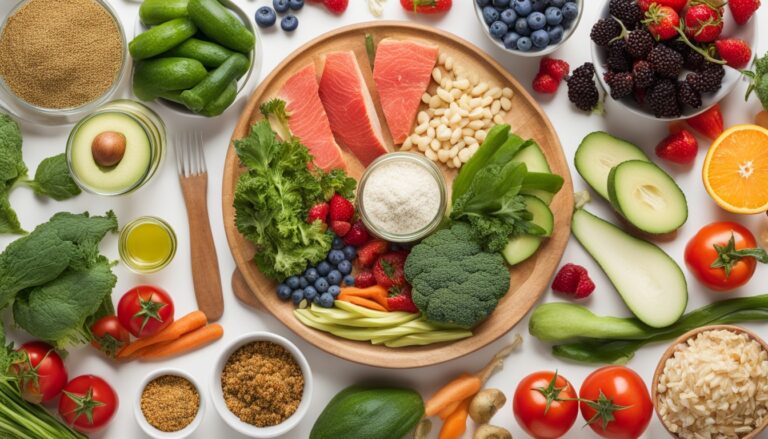Are you looking for a way to boost both your brain and gut? We’ve got you covered. This guide shares the top 7 foods that are great for both your mind and stomach.
From fatty fish packed with omega-3 to berries loaded with antioxidants, these superfoods will astonish you with their benefits.
We’re going to explore the most recent findings and insights from experts. Learn how these foods improve mental sharpness memory, and your health. Adding these foods to your diet is a fun way to enhance your brain and digestive health.
Key Takeaways
- Discover 7 powerful foods that can nourish both your brain and gut health
- Explore the science backed benefits of omega-3s antioxidants, and probiotics for cognitive and digestive function
- Learn how to easily incorporate these nutrient-dense superfoods into your meals for a brain-gut health boost
- Understand the intimate connection between the brain and gut and how supporting one can benefit the other
- Unlock the power of wholesome, plant-based nutrition to support your overall well being
The Brain Gut Connection
The brain and gut are closely linked by the gut-brain axis. This system connects the central nervous system with the gut. It’s a two way street that allows the gut microbiome to affect brain function and mental health. The microbiome is made up of trillions of microorganisms in our digestive system.
Understanding the Gut Brain Axis
This axis is a vibrant network that links the gut microbiome with our brain. It lets our stomach’s inhabitants and our brain communicate. This back and forth helps our body to produce neurotransmitters like serotonin.
These neurotransmitters keep our mood, cognitive function, and well-being in check. Many pathways help in this communication including the nervous system and more.
Importance of a Healthy Gut Microbiome
A varied gut microbiome is key for good brain health. It aids in the production of serotonin, which affects your mood and sleep. The gut also makes GABA which is good for easing fear and anxiety. Eating well boosts the health of your gut promoting the growth of these helpful microorganisms. This in turn helps both your brain and gut health.
Fatty Fish Rich in Omega-3s
Fatty fish like salmon, trout, and sardines are packed with omega-3 fatty acids. These are key for brain health. They help the brain’s structure, keep nerve function in check, and aid in making substances that help your brain work.
Studies show that omega-3s can boost memory slow down thinking problems as we age, and cut the risk of Alzheimer’s. They might also make you feel happier and lessen depression risk by fighting inflammation. Eating fatty fish often is good for your brain and thinking skills.
Benefits of Omega-3 Fatty Acids
Omega-3 fatty acids specifically EPA and DHA, are vital for the brain. They help brain cell walls stay healthy and work well. Plus, they’re key in making chemicals that affect how you think, remember things, and feel.
Research suggests a diet rich in omega-3s might help your brain stay sharp as you get older. It may also lower Alzheimer’s risk.
Best Sources of Fatty Fish
There are many tasty fatty fish packed with omega-3s:
- Salmon: Gives you 2,150 mg of EPA and DHA in 3.5 oz 100 g.
- Mackerel: Has 4,580 mg of EPA and DHA in 3.5 oz 100 g.
- Herring: Contains 2,150 mg of EPA and DHA in 3.5 oz 100 g.
- Sardines: Packs 1,463 mg in a cup 149 g or 982 mg in 3.5 oz 100 g.
- Anchovies: Offers 2,053 mg in 3.5 oz 100 g.
- Caviar: Provides 6,540 mg in 3.5 oz 100 g.
Eating these fatty fish can help you get the omega-3s your brain needs. This supports clear thinking and good health.

Blueberries Antioxidant Powerhouses
Blueberries are full of strong antioxidants. These include anthocyanins, which fight off free radicals. They help protect our brains, reducing stress and inflammation. This can lead to better brain cell communication and a slower loss of memory as we age.
Role of Antioxidants in Brain Health
Antioxidants in blueberries fight oxidative stress. This stress is linked to brain diseases. Studies show that these plant compounds can boost memory and brain function. Blueberries are a great choice to keep our brains healthy.
Blueberries and Memory Improvement
Eating blueberries helps keep our brains in top shape. Their antioxidants improve memory and cognition, especially for the elderly. By fighting stress and inflammation, blueberries might slow down age-related memory loss.
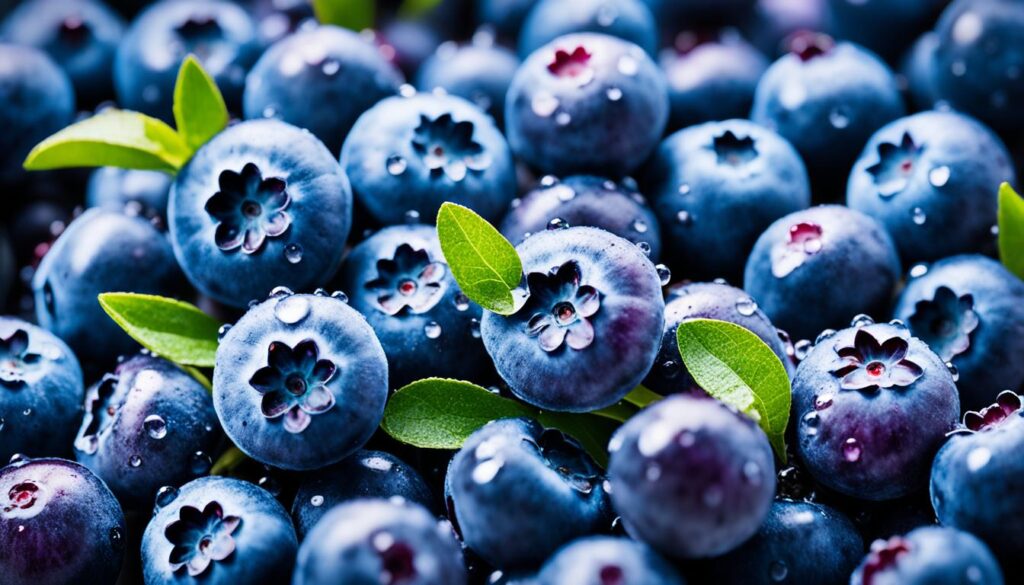
Leafy Greens: Nutrient-Dense Superfoods
Leafy green vegetables, like spinach, kale, and collard greens, are great for your brain. They are full of important vitamins and minerals. These include vitamin K and folate, which your brain needs to work well.
Vitamin K helps form sphingolipids. These fats are a key part of brain cells. Folate is also essential, aiding in making neurotransmitters. Plus these greens have antioxidants. These protect the brain from damage. Adding microgreens like cress arugula, and pea shoots can give you even more vitamins and minerals.
| Leafy Green | Nutrient Highlights |
|---|---|
| Kale | 1 cup 21g of raw kale provides 68% of the Daily Value DV for vitamin K, 6% of the DV for vitamin A, and 22% of the DV for vitamin C. |
| Collard Greens | One cup 36g of raw collard greens contains 131% of the DV for vitamin K, making it one of the best sources of this vitamin among leafy greens. |
| Spinach | One cup 30g of raw spinach provides 121% of the DV for vitamin K, 16% of the DV for vitamin A, and 12% of the DV for manganese. |
| Beet Greens | One cup 38g of raw beet greens includes 127% of the DV for vitamin K, 13% of the DV for vitamin A, and 12% of the DV for vitamin C. |
| Watercress | One cup 34g of raw watercress provides 17% of the DV for vitamin C, 6% of the DV for vitamin A, and 71% of the DV for vitamin K. |
| Arugula | One cup of raw arugula 20g contains 5% of the DV for folate, 3% of the DV for vitamin A, 3% of the DV for vitamin C, and 18% of the DV for vitamin K. |
Eat more of these superfoods to keep your brain sharp. By getting enough vitamin K, folate, and other vital vitamins and minerals, you’ll help your mind stay healthy.

Probiotic Foods Gut Friendly Allies
Probiotic foods like yogurt add a lot to our gut and mental well-being. They help our gut through a link with our brain called the gut-brain axis. When we eat these foods, our gut microbiome gets stronger. This means our brain works better and we feel good mentally.
Yogurt and Fermented Foods
Eating lots of probiotic foods might lower the chances of feeling sad or anxious. This could be because of how the gut microbiome affects our brain. Adding things like yogurt, kefir, and kimchi to your meals is fun and good for your mind and gut.
Probiotics and Mental Health
The link between gut health and how we feel mentally is clearer every day. A balanced gut microbiome benefits our thinking, mood, and mental health. By eating probiotic-rich foods, we help our gut and might feel less sad or worried.
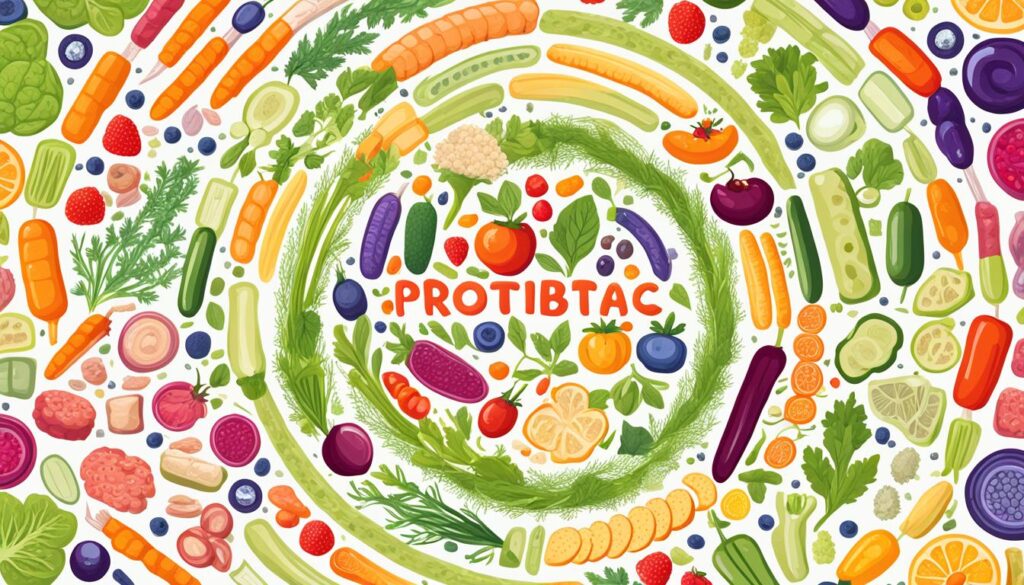
7 Foods for Brain and Gut Health
Nutrient Rich and Delicious Options
Start a tasty journey to boost your brain and gut health. Include these 7 superfoods in your meals. Fatty fish is rich in omega-3, while blueberries bring antioxidants. Every food here has special benefits for your body and mind.
Yogurt and cottage cheese are full of healthy bacteria. They can help your brain work better. Spinach and kale are packed with vitamins. They keep your brain sharp as you get older.
Boosting Cognitive Function and Digestive Health
Eating these foods can make your meals exciting and good for you. Have a bit of dark chocolate, some nuts and berries, or a salad with fresh herbs. They help your memory thinking, and digestion stay strong.
Want to think better, have a happy stomach, or just eat well? These 7 foods are your new best friends for health. Enjoy nutritious meals and see your body and mind thank you!
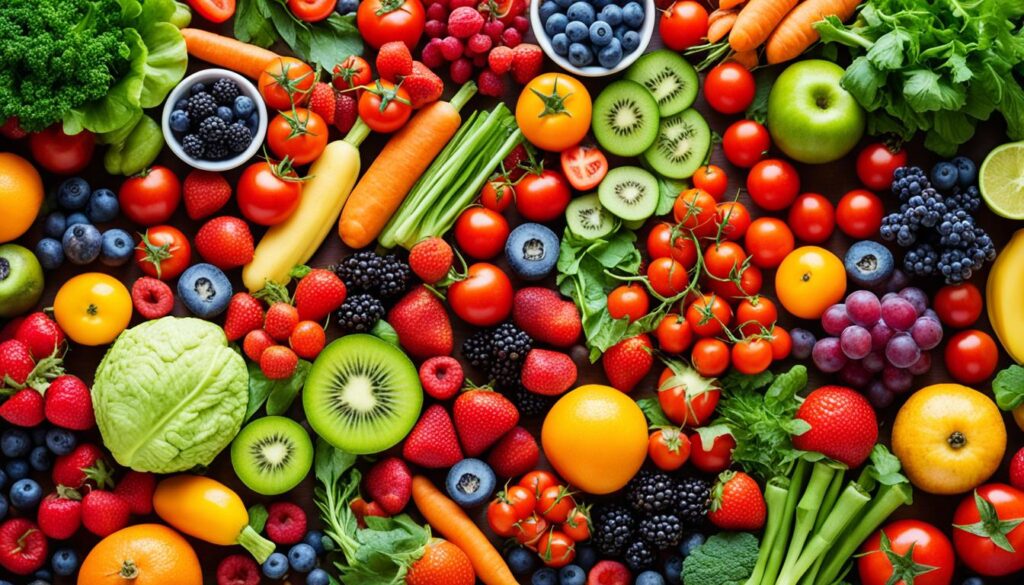
Dark Chocolate Indulge Mindfully
Enjoying dark chocolate is good for the brain. It contains flavonoids which are strong antioxidants. They guard the brain against damage and lower the risk of memory problems.
Studies show dark chocolate might also feed the good bacteria in your stomach. This could help lift your mood.
Flavonoids and Brain Benefits
Dark chocolate is packed with flavonoids. They boost blood flow to your brain, aid in brain cell communication, and may help create new brain cells. Acting against free radicals, dark chocolate might keep your mind sharp as you age.
Moderation is Key
Remember to eat dark chocolate in moderation. Some types have a lot of sugar and fat, which can be bad for you. When picking dark chocolate, choose one with cocoa content of at least 70%.
This way, you get the health benefits with fewer downsides. Being mindful about dark chocolate means enjoying it and staying healthy.
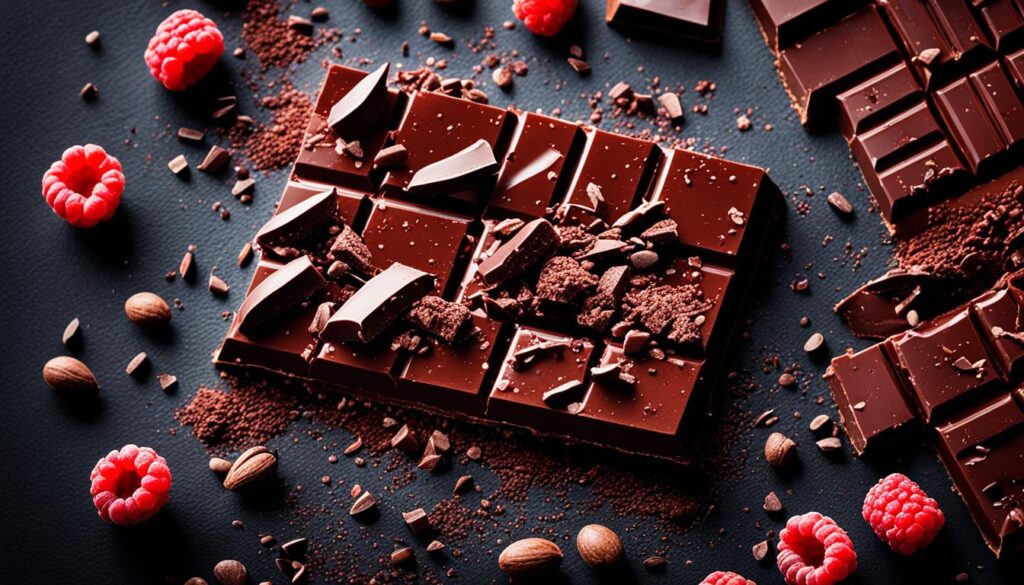
Nuts and Seeds Brain Boosting Snacks
Essential Nutrients for Mental Clarity
Nuts and seeds aren’t just tasty they help your brain too. They’re packed with vitamins and minerals like vitamin E. This nutrient fights off brain cell damage.
They’re also full of fats, including omega-3s that your brain loves. Plus, antioxidants in them can boost your focus. You can eat them alone or with your meals to make life better for your brain.
| Nut/Seed | Key Brain Boosting Nutrients | Benefits for Cognitive Function |
|---|---|---|
| Walnuts | Omega-3 fatty acids, DHA | Prevent cognitive decline, improve memory and focus |
| Almonds | Vitamin E, magnesium, L-carnitine | Enhance memory, reduce oxidative stress, support brain energy metabolism |
| Pumpkin Seeds | Zinc, magnesium, copper, iron | Crucial for optimal brain function, neuronal communication, and mood regulation |
| Sunflower Seeds | Vitamin E, thiamin, choline, selenium, vitamin B6 | Improve memory, cognition, and neural plasticity |
Eating nuts and seeds daily offers major brain benefits. They enhance your mental sharpness and thinking power.
Herbs and Spices Flavor with Benefits
Forget salt and pepper – herbs and spices rule the spice rack. They make simple meals into tasty delights and bring many health benefits. For example, turmeric has curcumin that fights inflammation and is rich in antioxidants. These plant stars, like basil, boost our brains and guts with their nutrients.
Turmeric and Curcumin
Turmeric is known for its bright gold color and is a favorite in Indian cooking. It has curcumin, which is great at reducing inflammation and has strong antioxidant powers. Studies show it might help with memory, depression, and can help grow new brain cells. So, adding turmeric to your meals can be really good for your brain.
Fresh Herbs for Added Nutrition
Using fresh herbs like basil, parsley, and cilantro adds more nutrition to your food. These greens are packed with vitamins minerals, and other good stuff. This kind of food is great for your brain and gut health. Think about making pesto adding herbs to your food, or having herbal tea. It’s all about giving your body the best support.
Oranges Vitamin C for Brain Health
Oranges are packed with vitamin C, a key nutrient for our health. It’s an antioxidant that keeps our brain sharp. Vitamin C shields our brains from harm by free radicals and oxidative stress. These can lead to thinking issues as we get older and other brain problems.
Research shows that more vitamin C in our blood helps us think better. It boosts our focus, memory, and decision-making skills. Plus, vitamin C can help lighten the load for people dealing with depression and anxiety. So, adding oranges to your diet benefits your brain in many ways.
Conclusion
This article has guided you through seven amazing foods. These foods can improve both your brain and your gut. They lead the way to being truly healthy and feeling good. We explored fatty fish full of omega-3 and blueberries packed with antioxidants. These superfoods stand by us in our search for better brain health, gut health, cognitive function, and digestive wellness.
Understanding the strong link between our brain and gut is key. It helps us make smart choices. Choices that boost our well being. Enjoy rich dark chocolate or eat some brain aiding nuts and seeds. Or add more leafy greens to your dishes. These seven foods are both delicious and powerful. They help us eat better and reach our health goals.
As you move forward, remember the power of these nutrient-rich foods. Let them guide you to a brighter, healthier you. Enjoy your food, and may your brain and gut work in perfect harmony!


